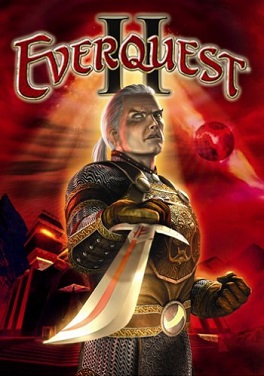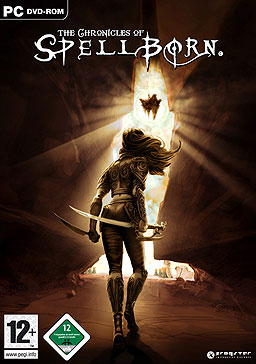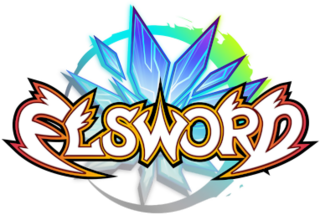PristonTale is a 3D fantasy MMORPG that centers on action-based role-playing. It was originally released in South Korea by Yedang Online in 2001. It was created by Triglow Pictures Inc. and has since been published for Japan, China, Taiwan, Malaysia, Thailand, Vietnam, Philippines, Brazil and the Spanish-speaking countries. In 2004, the English version of PristonTale went out of public beta and became a commercial pay-to-play game. On May 17, 2007, PristonTale announced free-to-play service for everyone; instead of paying for the game, PristonTale has a cash shop in which players can pay real money for game items. On September 30, 2008, the English server for Priston Tale closed; Suba Games opened a new English server three days later. There are more players in the private servers.

EverQuest II is a 3D fantasy massively multiplayer online role-playing game (MMORPG) originally developed and published by Sony Online Entertainment for Microsoft Windows PCs and released in November 2004. It is the sequel to the original EverQuest, released five years earlier, and features updated graphics and more streamlined gameplay compared to the previous entry, as well as an abundance of voice acting with contributions from actors such as Christopher Lee and Heather Graham. In February 2015, Sony Online Entertainment's parent corporation Sony Computer Entertainment sold it to investment company Inception Acquisitions, where it continues to develop and publish the game under its new name, Daybreak Game Company.

GunZ: The Duel, or simply GunZ, was an online third-person shooting game, originally created by South Korean-based MAIET Entertainment and currently still owned by MAIET Entertainment.

A quest, or mission, is a task in video games that a player-controlled character, party, or group of characters may complete in order to gain a reward. Quests are most commonly seen in role-playing games and massively multiplayer online games. Rewards may include loot such as items or in-game currency, access to new level locations or areas, an increase in the character's experience in order to learn new skills and abilities, or any combination of the above.

Granado Espada is a Korean fantasy MMORPG developed by IMC Games Co., Ltd. Originally released in South Korea in February 2006, the English localizations were launched in the summer of 2007 in North America and Southeast Asia. Granado Espada won the 2006 Korean Presidential Award for Best Graphics and Game of the Year, with features previously unseen in an MMORPG. Granado Espada features a unique art style based on the Baroque period of Europe, differing from the standard “sword and sorcery” fantasy themes of the genre.

Soul of the Ultimate Nation was a fantasy-based massive multiplayer online role-playing game (MMORPG) produced by Webzen, a Korean-based company. It was operated in South Korea by Webzen and in mainland China by The9. The game was launched in Taiwan on April 19, and in China on May 24, 2007 as a paid online service and closed on July 3, 2013.

Aion: The Tower of Eternity is a massively multiplayer online role-playing game (MMORPG) developed and published by the South Korean company NCSoft. The game combines PvP and PvE in a fantasy game environment. As of May 2009, Aion had 3.5 million subscribers in Asia. AION's first major expansion pack was released to North America and Europe on September 7, 2010 under the name Aion: Assault on Balaurea. Truly Free launched on April 11, 2012 with no restrictions. The second major expansion was released in North America on June 26, 2013 under the name Aion: Dark Betrayal. Its most recent expansion was launched on July 13, 2016 under the name Aion: Echoes of Eternity.

La Tale is a 2D side-scrolling online game developed by South Korean studio Actoz Soft. Gamers take the role of adventurers in a mythological fantasy world with three continents, Jiendia, Freios, and Eastland.

Cabal Online is a free-to-play, 3D massively multiplayer online role-playing game developed by South Korean company ESTsoft. Different localizations of the game exist for various countries and regions. Although free-to-play, the game makes use of the freemium business model by implementing an "Item Shop", both in-game and via web, allowing players to purchase special premium coins using real currency, in order to acquire exclusive game enhancements and features, useful items and assorted vanity content.

The Chronicles of Spellborn was a massively multiplayer online role-playing game (MMORPG) initially released on November 27, 2008, developed by Spellborn International and distributed by Frogster Interactive, Mindscape and Acclaim Games; set in a post-apocalyptic fantasy world. Spellborn used the Unreal Engine, featured a European Art approach and contained notable contributions from Jesper Kyd. In August 2010, the game was shut down. As of 2019, the game is still played on a proprietary private server that is operated by a former developer.
World of Warcraft (WoW), is set in a fictional universe, with its primary setting being the planet of Azeroth. The first expansion, The Burning Crusade, introduced a second planet, Outland. Wrath of the Lich King expanded upon Azeroth and added Northrend, the frigid northern continent of Azeroth, while the next expansion, and Cataclysm, drastically changed various other continents by destroying some and unveiling new ones. The next expansion, Mists of Pandaria, added Pandaria, the southern continent previously hidden behind a perennial mist cover. Warlords of Draenor introduced the planet of Draenor, a version of Outland in a different timeline before its partial destruction. The Legion expansion took adventurers to the Broken Isles, an island chain near the Maelstrom in the middle of the Great Sea, and the damaged planet Argus, the headquarters of the Burning Legion. The seventh expansion, Battle for Azeroth, added two new island continents to the center of Azeroth: Kul Tiras and Zandalar. The latest expansion, Shadowlands, introduced the eponymous Shadowlands, a realm composed of five major zones: Bastion, Maldraxxus, Ardenweald, Revendreth, and the Maw.

Atlantica Online is a free-to-play (F2P) 3D tactical massively multiplayer online role-playing game (MMORPG) developed by NDOORS Corporation. The game is currently published by Valofe. The game's primary setting is a fantasy-themed alternate history Earth composed of a diverse blend of historical, cultural, allegorical, and mythological elements. The game world is primarily modeled after real-world geography with accessible locations on six of the seven continents as well as the mythical floating continent of Atlantis from which the game's name is derived.
Fragoria is a browser based, free to play massively multiplayer online role play game of a Russian indie developer Rusoftware and its Europe based successor Datcroft Games. Fragoria is set in a massive, fully realized world based on Slavic fairy tales and legends of the modern world. There are more than 800 quests that can be played and several dungeons that can be explored. There are also a handful of PvP games to become involved in, ranging from simple 1 on 1 duels to full-scale wars with objectives. The game features an advanced pet system, an auction house for players to sell their items, a mail system, an extensive crafting system and four professions to choose from. The game is played on the Adobe Flash engine, in an isometric 3D perspective. It has been praised for its ability to efficiently use the engine.

Twelve Sky, often referred to as 12 Sky, was a massively multiplayer online role-playing game. It is Korean developer Alt1's first released game set in the Oriental Fantasy universe launched in its home market in 2004. Aeria Games announced Twelve Sky Closed Beta on September 5, 2007. The Closed Beta date was set to be on September 18, 2007. Twelve Sky then went into Open Beta on October 12, 2007. AeriaGames announced the closing of the game on April 6, 2010 on their forums. The game officially closed on April 30, 2010 with their item mall closing on April 13, 2010.

Darkfall was a massively multiplayer online role-playing game (MMORPG) developed by Aventurine SA that combined real-time action and strategy in a fantasy setting. The game featured unrestricted PvP, full looting, a large, dynamic game world, and a player-skill dependent combat system free of the class and level systems that typify most MMORPGs. Darkfall had a 3D world environment and contained mild violence. The official Darkfall servers were closed on 15 November 2012.

Vindictus is a free-to-play massively multiplayer online role-playing game (MMORPG) created by devCAT, an internal studio of Nexon. The story follows the player character joining a group of mercenaries and going on a series of missions to battle monsters. The gameplay has players exploring dungeons, fighting monsters, and upgrading their characters.

Flyff is a fantasy MMORPG by Korean development company Gala Lab.

Artix Entertainment, LLC is an independent video game developer and publisher founded by Adam Bohn in October 2002. It is best known for creating browser-based role-playing video games—including AdventureQuest, DragonFable, MechQuest, and AdventureQuest Worlds—using Adobe Flash. Following the end of life of Adobe Flash Player in 2021, Artix developed a standalone launcher for personal computers that includes many of the company's popular Flash-based games, most of which continue to receive content updates.

Battle of the Immortals was a free-to-play massively multiplayer online role-playing game (MMORPG) by Perfect World Entertainment. Beta began on April 14, 2010, and is open to all users with a Perfect World account. On April 30, 2010, the closed beta ended and the open beta began on May 4, 2010. The Guardians of Fate was released on February 22, 2012. Battle of the Immortals takes place in Western Europe, where the player takes the role of a hero to help revive Odin. Besides, Battle of the Immortals is published by Joygame in Turkey since July, 2012. The closed Beta started on September 18, ended on October 11. The open beta which started on October 25 is still on. The game closed all its servers on January 8, 2018.

Elsword (Korean: 엘소드) is a free-to-play, 2.5D action MMORPG developed by the South Korean company KOG Studios. It features real-time action gameplay and includes both player vs. environment and player vs. player modes. There are fourteen playable characters within the game, each with unique backstories and distinct abilities. While playing the game is free, some items and costumes can be purchased through an in-game "Item Mall" using real currency. The game was originally made with the intention of being the spiritual successor to Grand Chase by upgrading the graphics from 2D to 2.5D.

















